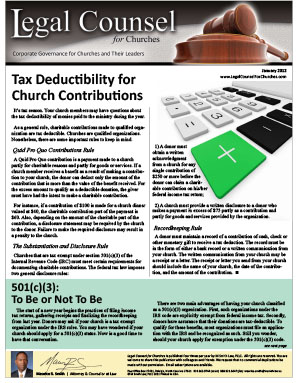It’s tax season. Your church members may have questions about the tax deductibility of monies paid to the ministry during the year.
As a general rule, charitable contributions made to qualified orga- nization are tax deductible. Churches are qualified organizations. Nonetheless, there are some important rules to keep in mind.
Quid Pro Quo Contributions Rule
A Quid Pro Quo contribution is a payment made to a church partly for charitable reasons and partly for goods or services. If a church member receives a benefit as a result of making a contribu- tion to your church, the donor can deduct only the amount of the contribution that is more than the value of the benefit received. For the excess amount to qualify as a deductible donation, the giver must have had the intent to make a charitable contribution.
For instance, if a contribution of $100 is made for a church dinner valued at $40, the charitable contribution part of the payment is $60. Also, depending on the amount of the charitable part of the contribution, a disclosure statement may be required by the church to the donor. Failure to make the required disclosure may result in a penalty to the church.
The Substantiation and Disclosure Rule
Churches that are tax exempt under section 501(c)(3) of the Internal Revenue Code (IRC) must meet certain requirements for documenting charitable contributions. The federal tax law imposes two general disclosure rules:
1) A donor must obtain a written acknowledgment from a church for any single contribution of $250 or more before the donor can claim a charit- able contribution on his/her federal income tax return;
2) A church must provide a written disclosure to a donor who makes a payment in excess of $75 partly as a contribution and partly for goods and services provided by the organization.
Recordkeeping Rule
A donor must maintain a record of a contribution of cash, check or other monetary gift to receive a tax deduction. The record must be in the form of either a bank record or a written communication from your church. The written communication from your church may be a receipt or a letter. The receipt or letter you send from your church should include the name of your church, the date of the contribution, and the amount of the contribution.

